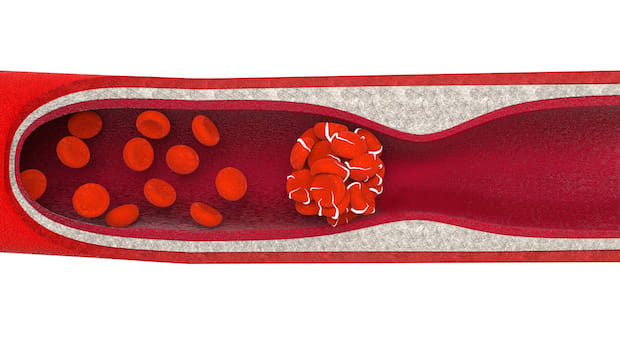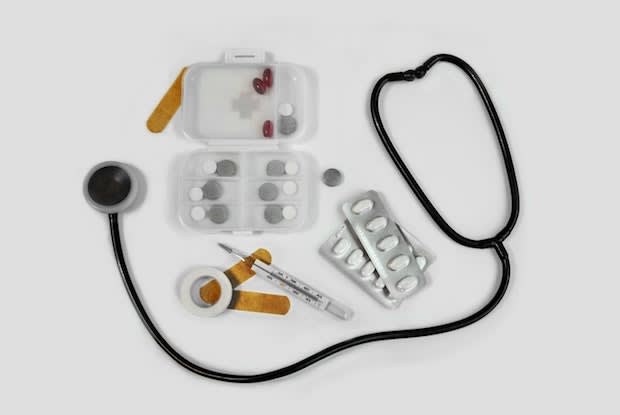Table of Contents
I. The Function of Blood Thinners
III. Depression Medications & Blood Thinners
IV. Antibiotics & Blood Thinners
The Function of Blood Thinners
Blood thinners are necessary for many individuals who have had vascular problems or are at risk for blood clots. The function of blood thinners is to help blood move smoothly through the veins and arteries. Blood thinners can protect people from heart attacks and strokes, especially if they have heart disease or heart defects. You may be prescribed a blood thinner like Xarelto (rivaroxaban), Elmiron (pentosan polysulfate sodium), Coumadin (warfarin), or Eliquis (apixaban) if you have any of the following conditions:
- Atrial fibrillation
- Heart valve replacement
- After surgery, if there is a risk for blood clots
- Diseases of the blood vessels like deep vein thrombosis (DVT) or pulmonary embolism (PE) [1]
When your body experiences a cut or injury, blood platelets rush to the site of the injury to clot together and prevent excessive bleeding. Taking blood thinners lessens the effectiveness of this bodily process to prevent dangerous clots, increasing your risk of a bleeding event. On top of that, other common medications can create unwarranted side effects in the body. Learn more about interactions with blood thinners below.
NSAIDs (nonsteroidal anti-inflammatory drugs) are a class of medications used as painkillers. The most common NSAIDs include ibuprofen (Advil) and naproxen (Aleve). Everyone takes NSAIDs at one time or another, but you may have to curb your use if you take blood thinners. NSAIDs affect the way platelets work and interfere with normal blood clotting. If you take both a blood thinner and an NSAID, you are at an increased risk of a dangerous bleeding event. For many, it isn't easy to give up NSAIDs altogether because they are so common in everyday healthcare. Your doctor may have to find alternative pain-relieving methods if you are taking blood thinners. Tell your doctor if you are taking any of these drugs before starting a blood thinner: Depression medications and blood thinners are some of the most common medications taken by Americans. Between 2015 and 2018, the CDC reported that 13.2% of Americans over 18 had taken antidepressants in the previous 30 days. [3] If you have chronic depression, you are at a greater risk of accompanying conditions that may lead to the development of blood clots. Because of this, it is essential to tell your doctor if you take a particular antidepressant called a selective serotonin reuptake inhibitor (SSRI). The exact reason why SSRIs increase bleeding risk with blood thinners is still being researched, but there are some theories. Experts believe that blood platelets' ability to clot is related to serotonin, so blocking the serotonin may not allow platelets to clot as well. This risk is not as severe as NSAIDs but should be monitored closely. Most doctors and patients continue antidepressant treatments because the benefits outweigh the risk. [4] Coumadin is the blood thinner that is known to interact with most medications and substances. If you take Coumadin, you should be wary before using certain antibiotics. Antibiotics like antifungal agents can increase warfarin's blood-thinning ability, which increases the risk of internal bleeding. Some other antibiotics, like rifampin, have the opposite effect and make it more likely for a blood clot to form. Fungal and bacterial infections occur to everyone, and you cannot quit taking essential medications like blood thinners to clear up an infection. If you need an antibiotic, your doctor should closely monitor your condition to ensure no adverse reaction or internal bleeding. There is a common misconception that drug interactions only occur with oral pills, but topical antibiotics can also be absorbed into the bloodstream and cause reactions. Antibiotic ointments, creams, and suppositories may also interact with warfarin. [5] Usually, vitamin K-rich foods won't have a disastrous effect on your blood thinner medications. Still, you may experience problems if you suddenly start eating a lot of vitamin K foods. Certain foods can actually decrease the function of blood thinners like warfarin. Because of this, you may want to eat the following foods in moderation: These vegetables are a healthy part of a varied diet, so do not stop consuming vitamin K foods altogether. If you are being prescribed a blood thinner like Xarelto (rivaroxaban), Elmiron (pentosan polysulfate sodium), Coumadin (warfarin), or Eliquis (apixaban), make sure to tell your doctor if you consume a high amount of these foods. [6] The content in this article is intended for informational purposes only. This website does not provide medical advice. In all circumstances, you should always seek the advice of your physician and/or other qualified health professionals(s) for drug, medical condition, or treatment advice. The content provided on this website is not a substitute for professional medical advice, diagnosis, or treatment.
Blood Thinners & NSAIDs
Depression Medications & Blood Thinners

Antibiotics & Blood Thinners

Be Aware of Vitamin K
